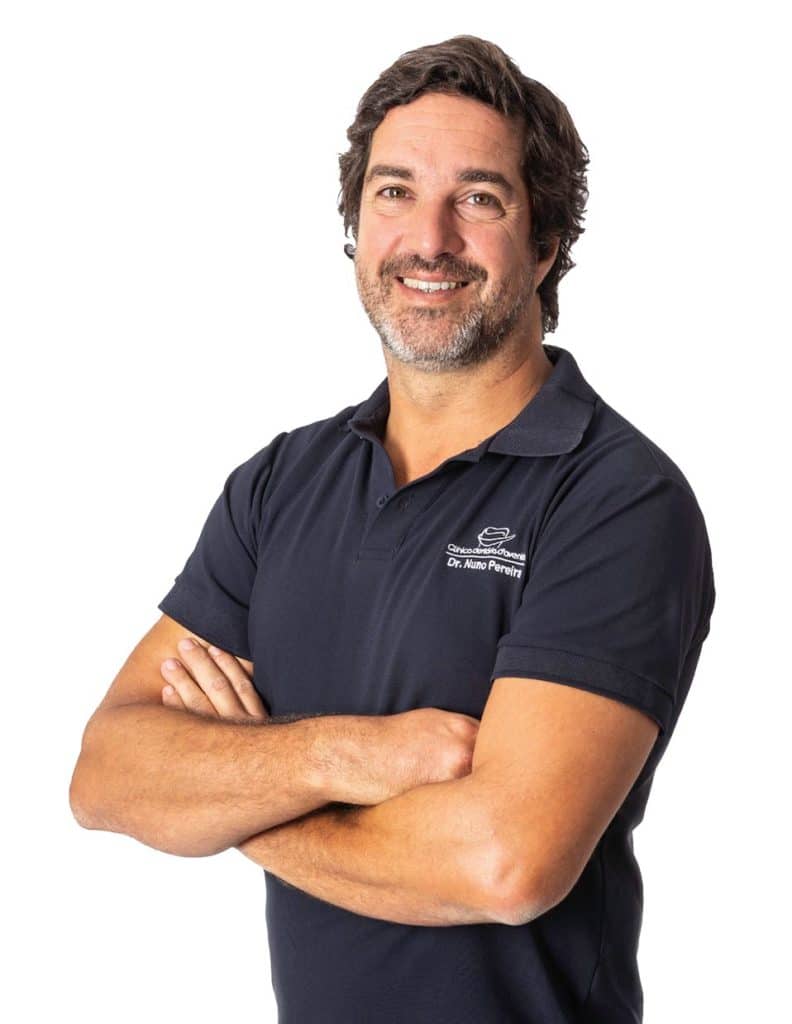Implantology
Implantology is the area of dental medicine dedicated to placing dental implants. A fixed and permanent solution that safely replaces lost teeth, giving new comfort to your mouth and teeth.
A new life for your teeth and more comfort for your daily life
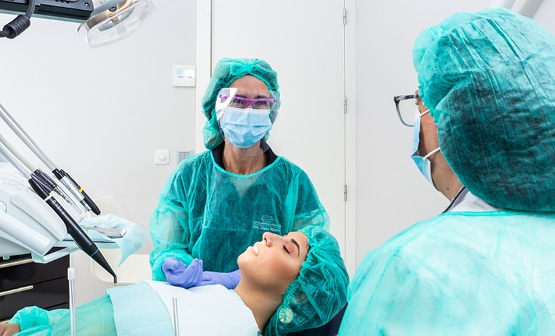
Implantology is the branch of dental medicine dedicated to placing dental implants to replace missing teeth. Dental implants, which are substitutes for the tooth roots, are made of a titanium alloy that is biocompatible with the human organism. They provide a solid base for the replacement of single crowns, fixed or removable bridges, partial or total, allowing the patient to recover the comfort of natural teeth.
Nowadays, given the scientific and technological advances in the field of implantology, success rates are very high. The importance of a good diagnosis and treatment plan is essential. At Clínica D’Avenida, we have the technical and technological capacity to carry them out using a completely digital workflow. The diagnosis is made starting with an analysis of a 3D digital radiographic image (CBCT – Cone Beam Computorized Tomography) and an intra-oral scan (3-shape). These images are used in combination, to perform the virtual surgery, and to produce surgical guides that will enable the placement of the implants in a more precise way.
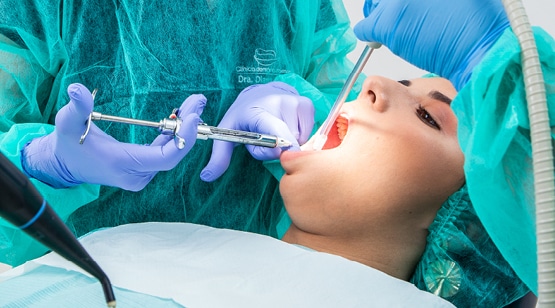
the treatment
Implantology step by step
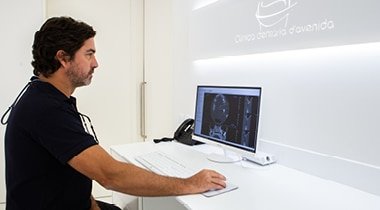
1. Planning
The quantity and quality of the existing bone structure and gum health should be evaluated. The patient will undergo other examinations that will define the best solution for each clinical case, as well as take moulds to obtain study models.
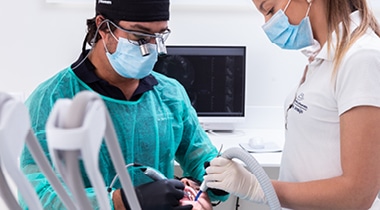
2. Surgery
During the surgery process, implants are placed where enough healthy bone is available. Without these conditions for the fixation of the implant, a bone graft can be performed so that the dental implant can have the necessary bone support. support.
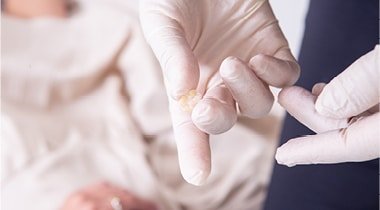
3. Prosthetic Rehabilitation
The placement of acrylic crowns fixed to implants on the same day as the surgery is possible if the patient is able to do so. The definitive rehabilitation is carried out after complete healing. It is at this stage that the crowns or bridges (permanent teeth) are placed.


Dental implants
Choosing dental implants over other clinical solutions ultimately brings you the best result, both functionally and aesthetically. Implants are the only option for dental rehabilitation that stimulate and preserve natural bone. Their osseointegration success rate is 95% to 98%. The recovery of chewing capacity is 85%-95%, when compared to natural teeth.
WHY CHOOSE IMPLANTS
Advantages of Implantology and Implants
Resistance
Dental crowns have great resistance to stress forces such as those of mastication. They are highly resistant and effective, as well as being non-corrosive.
Durability
Dental implants are made of titanium and zirconia and are, therefore, able to resist the effects of time, and are not subject to oxidation.
Appearance
The crowns produced in the laboratory follow the anatomy of your teeth, in order to achieve a similar product in terms of colour and appearance/shape.
Confort
After placing the crowns (permanent teeth), you will be able to enjoy all the inherent comfort, since the implants/crowns behave like “normal” teeth.
CLINICAL STAFF
Our Implantology and Oral Surgery team
Straumann Implants
At Clínica D’Avenida, we use Straumann implants, a worldwide renowned Swiss brand, due to the fact that it gives us the confidence to provide patients with a guarantee of quality.
DSL Laboratory
The placement of crowns or bridges on implants is carried out in partnership with our laboratory (DSL – Dental Solutions Lab), which is located on our premises, allowing for an easier Dentist / Prosthesis Technician dynamic.
Permanent Solution
Dental implants do not have an expiry date. However, the long-term success of cases is directly related to oral hygiene care. It is essential that periodic visits to the dentists are made in order to monitor and maintain them.
BOOK AN APPOINTMENT
Do you want to renew your smile? Discuss with your dentist the best solution for your clinical case and find out more about all the stages of the implant process, so that you can make an informed choice.
QUESTIONS
Implantology FAQs
Dental implants are the “state of the art” for tooth replacement. They integrate into the bone providing support for dental crowns and prostheses.
Your jaws begin to shrink due to lack of stimulation. Losing teeth will affect your smile and change the shape of your face, making you appear to age prematurely. Antagonist teeth may begin to extrude and adjacent teeth may move.
Dental implants can be placed in most adults. Please, ask your implant specialist about the benefits and risks in order to understand if dental implants are right for you.
No. Dental implants are normally placed under local anaesthetic. It may be under sedation in more demanding surgeries, or in cases of phobia towards the dental procedure.
You can usually return to work the following day unless instructed by your dentist. You will be prescribed medication to relieve any minor discomfort you may have.
It depends greatly on your particular case. It can range from 15 minutes, for placing a single implant, to 2 to 3 hours for a complete bi-maxillary case.
In these cases, a gingival or bone graft (or both) may be necessary.
Treatment time varies greatly according to the patient. You may have temporary teeth on the same day, but this may not be possible. The conventional protocol allows the definitive crowns to be placed 2 to 4 months after placing the implants. However, there are cases when it is possible to place the “teeth in one day” and others when you have to wait 9 months to one year for the bone regeneration in order to place the implants. Your dentist can provide an estimated time based on your treatment needs.
The care to be taken with implants is not very different from the care we should take with our teeth. It involves careful hygiene at home and regular visits (6/6 months) to your dentist for check-ups and scaling.
Implants can last for many years if they are well cared for. Modern implantology began in the 1960s, and many implants exist for more than 50 years.
Human beings are “blessed” with two sets of teeth (milk teeth and adult / permanent teeth). When a single permanent tooth or several teeth are lost due to tooth decay or periodontal disease, dental implants can replace them as a third set of fixed teeth! Dental implants can last a lifetime and can improve your appearance, your confidence and your ability to eat the foods you enjoy, as well as participate in an active lifestyle, without worrying about your teeth. Dental implants are made from titanium, and will never be susceptible to tooth decay!
Like any minor oral surgical procedure, there is a risk of infection, inflammation and pain, but your dentist will discuss how implants can be placed in your specific situation. If there is no bone available to place the implant, bone and gum grafting procedures may be required, which can increase the cost of treatment. However, the initial investment may pay off in the long run.
The osseointegration success rate of dental implants is very high, around 98%
APPOINTMENT

